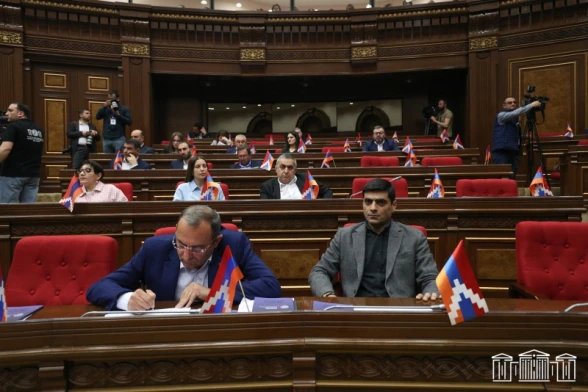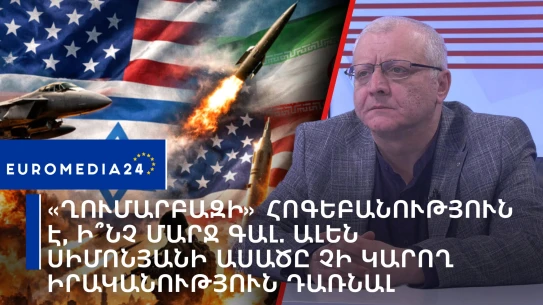in 2024 On August 30, the regulation "On the Joint Activities of the Commission for the Demarcation and Border Security of the State Border between the Republic of Armenia and the Republic of Azerbaijan and the State Commission for the Demarcation of the State Border between the Republic of Azerbaijan and the Republic of Armenia" (hereinafter referred to as the Regulation), signed by the presidents of the aforementioned territorial commissions of the Republic of Armenia contains serious threats undermining integrity, security and sovereignty. It contradicts both the international law and the national legislation of the Republic of Armenia.
In particular
The issue of the constitutionality of the creation and operation of the commission formed under the leadership of the Deputy Prime Minister of the Republic of Armenia was obviously ignored (especially by the decision of the Constitutional Court dated 26.09.2024 No. SDO-1749). The commission does not have a constitutional basis, because according to the Constitution and part 16 of Article 7 of the RA Law "On the Structure and Activity of the Government", which was defined as the legal basis for the creation of this commission, "The Prime Minister has the right to form consultative bodies".
The apparently unconstitutional body (commission), its head, and the officials supporting this body were given illegal powers to agree, seal (sign) on behalf of Armenia international legal documents of legal significance leading to territorial changes of the Republic of Armenia without a referendum, or to take actions leading to such consequences. What happened in the settlements of Tavush region also opens a loophole for further unconstitutional processes.
The regulation was signed, as well as the above-mentioned actions were taken under the threat of war, as Nikol Pashinyan and members of the ruling political force announced, claiming that by taking such actions, they are trying to mitigate, but not exclude, the threat of war. This circumstance, as well as the non-stop threats of the use of force by the military and political officials of Azerbaijan, the facts of our captured (hostage) compatriots being illegally kept in Azerbaijani prisons and continuously subjected to torture, were ignored by the political power of Armenia and the Constitutional Court, which contradicts Article 13 of the Constitution, as well as to the provisions laid down in Articles 52-53 of the Vienna Convention "On International Contract Law", which specifically define that international agreements concluded under the use of force or its pretext are null and void.
In 1991, declared by the regulation as a fundamental principle of the state border demarcation process. Alma Ata's declaration is apparently an attempt to mislead the public, as it did not guarantee the inviolability of the borders of the Republic of Armenia. In addition, as an argument for the application of the Alma Ata Declaration, the recognition of each other's territorial integrity by the signatory parties is presented, which is also stipulated in fundamental international legal documents (UN Charter, Helsinki Final Act). Although Azerbaijan declares its commitment to the principles of territorial integrity and inviolability of borders, it continues to occupy the sovereign territories of Armenia.
Avoiding the issue of determining the scope of arbitrarily selected cartographic documents, the political power of Armenia and the Constitutional Court ignored that the border demarcation and demarcation works between Armenia and Azerbaijan were completed in the late 1980s, regarding which the Armenian government had the necessary legal bases in its possession, but did not put into official circulation.
The Regulations do not include a requirement for parties to ratify without reservation. In addition, the Regulation has not passed the procedure of domestic agreement in Azerbaijan, which does not exclude the possibility of ratification by Azerbaijan with reservations unacceptable for Armenia.
The regulation refers to the agreement on the establishment of peace and interstate relations between the Republic of Armenia and the Republic of Azerbaijan, the text of which is not published, the content, the obligations and rights assumed by the parties are not known.
It is not known when this agreement will be agreed upon, approved and ratified. At the same time, according to the Regulations, demarcation can be carried out at any moment according to any principle, which is not known to the Constitutional Court or the National Assembly.
The positions reflected in the decision of the Constitutional Court almost literally repeat the thoughts reflected in Nikol Pashinyan's statements, the attempts to create (present) artificial contrasts between the Declaration of Independence of Armenia and the Constitution, which unequivocally proves that the decision of the Constitutional Court was made at the apparent dictate of the executive power, which in itself has no constitutional basis. with justice.
The reality of the already recorded partial demarcation, the absence of a dispute resolution mechanism in the Regulations, the possibility of using the not yet published Russian text in case of disagreement, also contain significant additional risks.
Accordingly, the "Armenia" faction of the National Assembly of the Republic of Armenia
DECLARES:
The conclusion of the Constitutional Court that the obligations assumed by the Regulation do not contradict the Constitution raises a reasonable suspicion of making a political order. The circumstances of carrying out demarcation and demarcation under the actual threat of force, as well as without proper authority, conducting negotiations on them, agreeing and signing (sealing) documents of legal significance were ignored.
It is also ignored that the Regulation does not contain mechanisms for managing many security risks. The existence of a clause in the regulation on the possible change of the fundamental principle of the demarcation process, the lack of a mechanism for resolving disagreements and disputes in peaceful conditions, applying the same principle to the demarcation of the entire border, as well as the exclusion of the threat of force (war) in interstate relations, the lack of obligations of the parties further emphasizes the uncontrollably high level of risks.
The process of internal agreement (ratification) of the regulation in both countries does not proceed simultaneously, in order to exclude the possibility of ratification by Azerbaijan with unacceptable reservations.
For the demarcation of the interstate border between the Republic of Armenia and the Republic of Azerbaijan, the starting border line must be clearly defined and described by the RA legislation, so that the possible change of that outline as a result of the demarcation is subject to a decision through a referendum.
Contrary to the uncertainty in the Regulation, during (during) delimitation, the application of the "nothing is agreed unless everything is agreed" principle applied in international best practice requires that the delimitation of any part cannot be considered final until the entire border has been described. Until the completion of the complete demarcation of the interstate border (if necessary, the organization of the referendum and the ratification of the results), demarcation and any redeployment of the armed forces are prohibited.
In addition, taking into account the above, taking into account the date of 21.10.2024. The results of the discussion of the issue in the Standing Committee on Foreign Relations of the National Assembly, the "Armenia" faction considers the process of border demarcation between Armenia and Azerbaijan, as well as the domestic procedures for the ratification of the Regulations, to be unconstitutional and contrary to the national-state interests of the Republic of Armenia. Therefore, the faction will not participate in the discussion and voting of the Regulations at the session of the National Assembly
"Armenia" faction of the National Assembly
21.10.2024


